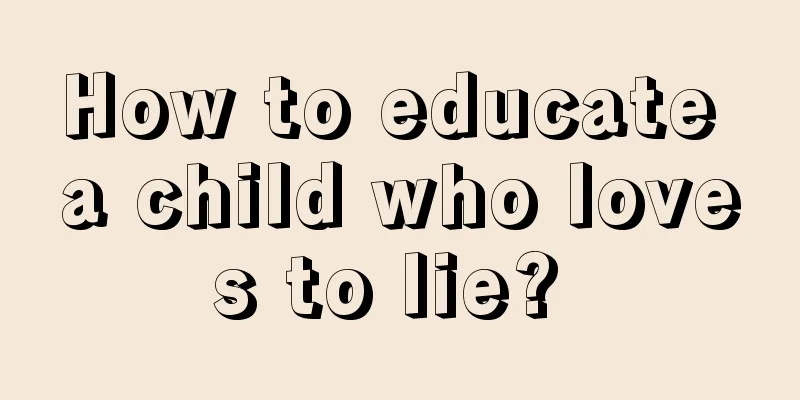How to educate a child who loves to lie?

| Children are innocent. Most of them can maintain a healthy and lively character until they grow up and mature. However, some children behave in ways that are contrary to ordinary people for various reasons. For example, lying is a phenomenon that many children have experienced. But how should we educate children who love to lie? This is a problem that parents need to solve carefully, and I hope everyone can understand something about it. 1. Confirm whether the child is lying. When parents suspect that their children are lying, they should first conduct a careful investigation and find out whether the child is really lying, because sometimes the judgment of parents is not necessarily correct. If they act rashly without finding out the truth of the matter, it may have an adverse effect on the child's mind and even cause tension in the parent-child relationship. 2. Find out the reasons for lying first, and then find out the right remedies. Parents do not need to make a fuss about unconscious lying caused by young children's low intelligence and knowledge level. Just help the children distinguish the difference between imagination and reality, because as the children grow older, these lying phenomena will naturally disappear; for children's intentional lying, parents should promptly discover and expose their lies, and let the children understand that lying will be criticized and punished, and resolve the children's attempts to lie in a timely manner; and if it is because the parents often lie that the children also lie, parents must seriously review their own behavior and set a good example for the children. 3. Listen more and communicate with your children. When children lie because they expect that something will have negative consequences, parents should understand their needs and establish more practical rules. If the child can do it and is willing to do it, he naturally doesn't need to lie. In addition, some children have few opportunities to interact with their parents, so they use lies to gain their parents' attention. In other words, parents should strengthen communication and interaction with their children, understand more about their children's thoughts, and let their children feel their parents' love and attention. 4. Help children distinguish between reality and imagination. Children do not always lie intentionally. Children who are young and have rich imagination and creativity are more likely to tell imaginative lies. In daily life, parents should pay attention to telling their children what happened and what is imaginary, so that children can gradually distinguish between reality and imagination, and tell them how to express their imagination, such as using "I think...", "I hope...", etc. When a child unintentionally lies and causes harm to others, it is important to make the child understand and recognize the serious consequences of his or her behavior. |
<<: What gift should I give to a child on his/her 100th day?
>>: Left ear pain accompanied by left nerve pain
Recommend
What are the symptoms of hip synovitis
Hip synovitis is a type of bone disease, which is...
What are the key points of postoperative care for colorectal cancer? Experts will introduce
Colon cancer is a disease that many people are af...
Five tips for treating knee pain caused by cold air
Traditional Chinese medicine mentions that cold a...
List of acidic and alkaline foods
Nowadays, many people pay attention to the acidit...
What are the contraindications of taking gout medicine
Gout is a type of joint disease, and its symptoms...
Is body odor contagious?
Body odor is a common and frequently occurring di...
What are the symptoms of lack of water in the body
People are prone to dehydration in autumn. The wa...
What is the normal heart rate for an adult
We often go to the hospital for physical examinat...
Beware of mysophobia: cutting nails can lead to amputation
Cleansing action 1: Picking ears Health disaster:...
What material is good for underwear?
We wear underwear every day, no matter whether we...
How to relieve pain in late stage nasopharyngeal carcinoma
Many cancers will have symptoms of pain in the la...
What are the benefits of drinking water in the morning
Maybe many of us love to drink water. Drinking wa...
How to relieve fever and headache effectively
Fever and headache are mostly caused by colds. If...
Complications after cholecystoenterostomy? How common are these complications?
There are many common complications in the postop...
Is there any tea that can nourish the stomach?
Nowadays, due to irregular diet and other reasons...









